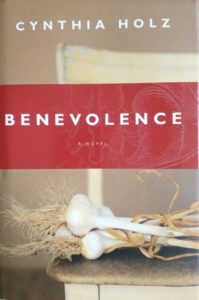
Click here to hear Holz talking about Benevolence.
Click here to read about altruism in Benevolence: https://livingdonorsonline.org/ldosmf/index.php?topic=2300.0
“Cynthia Holz has a gift for ordinary trauma. In Benevolence, patients and equally frail physicians struggle to recover from life’s pain. More alike than they know, braver than they think, Holz’s broken people tap into the mysterious interconnectedness that roots us under the surface.” (Marina Endicott, author of Good to a Fault)
“With Renata, Ben and Molly, Holz aims to reproduce the psychological experience—the inner reality—of being alive in the world. Into the difficult, quotidian and frequent horror of human existence, she weaves art, fleeting joys, tenacious hope, serendipitous coincidence and tangible magic… The most distinct characteristic of a work of fiction will always be the quality of the author’s voice—and no one can say it like she can.” (The National Post, April 2011. Read the full review here: https://nationalpost.com/afterword/book-review-benevolence-by-cynthia-holz)
“Benevolence is the fifth novel from Holz, a master at mining the terrain of coupledom—its sorrows as well as its absurdities, which she delves into with sensitivity and humour. Her strengths are apparent here in peripheral characters such as Molly, who flowers into an individual both courageous and admirable, if not precisely lovable. (Besides which, we may have in Molly the only fictional portrayal of a 73-year-old woman who is, stop the presses, permitted a sexual appetite.) This is a moving and sympathetic exploration of just how far we need, and need to be willing, to go to quell our longing—for creativity, for love, for children, for connection.” (The Globe and Mail, May 2011)
“This is a novel about altruism, motives, secrets. It has all the hallmarks of being by a writer who carries within herself the benefits of wisdom and reflection that come with age. It is a piece of writing that is carefully, thoughtfully constructed, that reminds me of Carol Shields’s Unless, Marina Endicott’s Good to a Fault, Bonnie Burnard’s Suddenly, Joan Barfoot’s Exit Lines, all novels intent upon exploring aspects of modern life, love, aging, that otherwise might not be noticed… What is striking is the even-handedness with which Holz treats her characters, and her steadfast refusal to find fault with them or to nudge the reader toward sympathy with one or another of these individuals. There are no heroes; nor, in the end, are there heroics… There are flashes of beauty and illumination, and when they happen they are subtle, and unexpected, in a field of garlic… Holz seems to be demanding of her readers a willingness to suspend disbelief, to go on a somewhat unconventional journey with her characters, just to see if, in that process, we are pulled toward an altered understanding of the mundane and predictable.” (Literary Review of Canada, May 2011)
“Holz has an uncanny ability to inhabit the minds of her protagonists, providing them with thoughts that evoke their marital alienation; it is unsettling to see how two people who clearly love one another can wrongly feel that they are able to read their partner’s mind. And it’s a testament to her abilities as an author to make the reader want to shout out, at several points, ‘Just talk to her! Just talk to him! Say what’s on your minds! If only!’ …All is resolved in the end [but] Holz doesn’t do the easy thing and give Renata and Ben a baby to take their—and our—cares away. She weaves together the separate strands of Ben and Renata’s lives in a masterful and structurally satisfying way, and we’re left as they are: hoping that transformation endures.” (The Medical Post, March 2011)
“This new novel by Cynthia Holz offers that beautiful combination of tension and tenderness… Holz is deeply skilled at conveying her characters’ emotional chaos. This isn’t a thriller by any means, but she knows how to make a reader feel very anxious… There are moments when you feel like shouting, ’Don’t go there,’ as you might in a horror movie… But in the end, Holz says more about human growth and connection than she does about weakness.” (NOW Magazine, March 2011)
“I will keep and reread this book simply for the wisdom contained within its pages. In the end, Holz’s characters find goodness in themselves in the most unexpected ways. They stop running from their fears and land in the now, reminded of nature’s interconnectedness and life’s capacity for new beginnings. In these moments, they renew their ability to love, and leave us with hope for their future. Benevolence will surprise you — if you take the time to let it do so.” (backofthebook.ca, March 2011. Read the full review here: https://backofthebook.ca/2011/03/19/doctors-healing-themselves/4709/)
“Holz masterfully integrates the external and inward lives of her characters by showing us what they say and do while revealing their thoughts and adding details of their pasts. In a few spots the prose seems as good as anything by Ann Tyler or Anita Brookner…” (Bill Gladstone, journalist and author, February 2012)
“Totally believable… This novel would be an ideal vehicle for teaching medical students or residents.” (Canadian Medical Association Journal, March 2012)
“This closely observed novel raises to consciousness the many ethical issues of altruistic organ donation [and is] well suited for book and journal clubs, especially those conducted by medical and psychology students and graduates and those that focus on ethical issues. Reading this novel [is] a pleasurable and stirring experience.” (Journal of Bioethical Inquiry, Australia, January 2014)